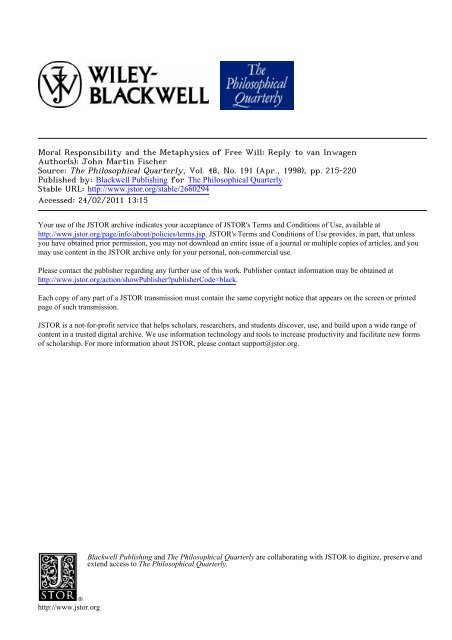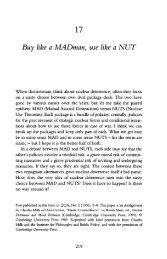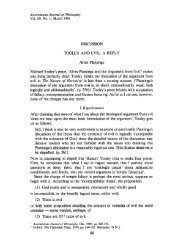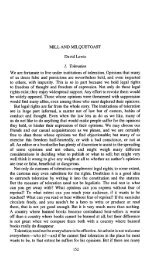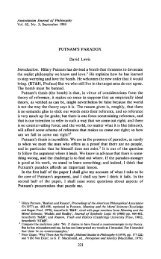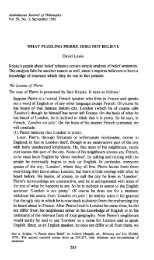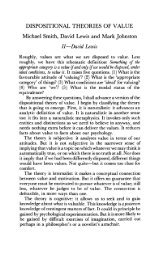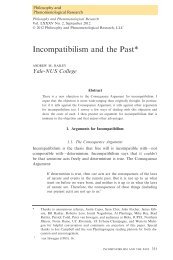Moral Responsibility and the Metaphysics of ... - Andrew M. Bailey
Moral Responsibility and the Metaphysics of ... - Andrew M. Bailey
Moral Responsibility and the Metaphysics of ... - Andrew M. Bailey
Create successful ePaper yourself
Turn your PDF publications into a flip-book with our unique Google optimized e-Paper software.
<strong>Moral</strong> <strong>Responsibility</strong> <strong>and</strong> <strong>the</strong> <strong>Metaphysics</strong> <strong>of</strong> Free Will: Reply to van Inwagen<br />
Author(s): John Martin Fischer<br />
Source: The Philosophical Quarterly, Vol. 48, No. 191 (Apr., 1998), pp. 215-220<br />
Published by: Blackwell Publishing for The Philosophical Quarterly<br />
Stable URL: http://www.jstor.org/stable/2660294 .<br />
Accessed: 24/02/2011 13:15<br />
Your use <strong>of</strong> <strong>the</strong> JSTOR archive indicates your acceptance <strong>of</strong> JSTOR's Terms <strong>and</strong> Conditions <strong>of</strong> Use, available at .<br />
http://www.jstor.org/page/info/about/policies/terms.jsp. JSTOR's Terms <strong>and</strong> Conditions <strong>of</strong> Use provides, in part, that unless<br />
you have obtained prior permission, you may not download an entire issue <strong>of</strong> a journal or multiple copies <strong>of</strong> articles, <strong>and</strong> you<br />
may use content in <strong>the</strong> JSTOR archive only for your personal, non-commercial use.<br />
Please contact <strong>the</strong> publisher regarding any fur<strong>the</strong>r use <strong>of</strong> this work. Publisher contact information may be obtained at .<br />
http://www.jstor.org/action/showPublisherpublisherCode=black. .<br />
Each copy <strong>of</strong> any part <strong>of</strong> a JSTOR transmission must contain <strong>the</strong> same copyright notice that appears on <strong>the</strong> screen or printed<br />
page <strong>of</strong> such transmission.<br />
JSTOR is a not-for-pr<strong>of</strong>it service that helps scholars, researchers, <strong>and</strong> students discover, use, <strong>and</strong> build upon a wide range <strong>of</strong><br />
content in a trusted digital archive. We use information technology <strong>and</strong> tools to increase productivity <strong>and</strong> facilitate new forms<br />
<strong>of</strong> scholarship. For more information about JSTOR, please contact support@jstor.org.<br />
Blackwell Publishing <strong>and</strong> The Philosophical Quarterly are collaborating with JSTOR to digitize, preserve <strong>and</strong><br />
extend access to The Philosophical Quarterly.<br />
http://www.jstor.org
MORAL RESPONSIBILITY AND THE METAPHYSICS OF FREE WILL 215<br />
MORAL RESPONSIBILITY AND THE METAPHYSICS<br />
OF FREE WILL: REPLY TO VAN INWAGEN<br />
BYJOHN<br />
MARTIN FISCHER<br />
I greatly appreciate Peter van Inwagen's thoughtful <strong>and</strong> engaging critical study <strong>of</strong><br />
my book The <strong>Metaphysics</strong> <strong>of</strong> Free Will.' In this brief reply I would like to sketch a<br />
strategy <strong>of</strong> response to his major criticism <strong>of</strong> my approach.<br />
Peter van Inwagen <strong>and</strong> I agree that <strong>the</strong>re is a very potent argument to <strong>the</strong> conclusion<br />
that causal determinism is incompatible with <strong>the</strong> sort <strong>of</strong> control that involves<br />
genuinely open alternative possibilities. But whereas van Inwagen believes that<br />
moral responsibility requires alternative possibilities (at some point in time), I do not;<br />
thus van Inwagen is an incompatibilist about causal determinism <strong>and</strong> moral<br />
responsibility, whereas I am not. I am a semi-compatibilist; I believe that causal determinism<br />
is compatible with moral responsibility, even if causal determinism rules<br />
out alternative possibilities.<br />
I follow Frankfurt in contending that <strong>the</strong>re is a set <strong>of</strong> examples which render it<br />
highly plausible that individuals can be morally responsible for <strong>the</strong>ir behaviour, even<br />
though <strong>the</strong>y do not have (<strong>and</strong> never have had) genuinely open alternative possibilities.<br />
Van Inwagen correctly points out that my discussion <strong>of</strong> this sort <strong>of</strong> example,<br />
although detailed in some ways, is relatively schematic in o<strong>the</strong>r ways. He contends<br />
that my crucial claim about <strong>the</strong>se examples - that <strong>the</strong>y suggest that moral<br />
responsibility depends on <strong>the</strong> actual history <strong>of</strong> an action <strong>and</strong> not upon <strong>the</strong> existence<br />
or nature <strong>of</strong> alternative scenarios - is 'at best misleading' (p. 375). He believes that I<br />
have gone astray by being insufficiently precise about <strong>the</strong> Frankfurt-style examples.<br />
More specifically, van Inwagen contends that <strong>the</strong>re are 'relatively precise principles<br />
relating moral responsibility <strong>and</strong> <strong>the</strong> ability to do o<strong>the</strong>rwise that are not refuted<br />
by Frankfurt-type examples' (p. 376). One such principle, according to him (ibid.), is<br />
as follows:<br />
If it is a fact that p, an agent is morally responsible for <strong>the</strong> fact that p only if that<br />
agent was once able to act in such a way that it would not have been <strong>the</strong> case<br />
that p.<br />
This principle (which I shall call <strong>the</strong> 'principle <strong>of</strong> possible prevention') implies that<br />
an individual with no alternative possibilities is not responsible for any fact. And van<br />
Inwagen fur<strong>the</strong>r points out that if no one is morally responsible for any fact, <strong>the</strong>n it<br />
i P. van Inwagen, 'Fischer on <strong>Moral</strong> <strong>Responsibility</strong>', Th7e Philosophical Quarterly, 47 (I997),<br />
pp. 373-8I. The present paper is a slightly revised version <strong>of</strong> a reply I gave to van Inwagen at<br />
an 'author-meets-critics' session on <strong>the</strong> metaphysics <strong>of</strong> free will at <strong>the</strong> American Philosophical<br />
Association Central Division Meetings, Pittsburgh, Pennsylvania, April I997.<br />
The Editors <strong>of</strong> The Philosophical Quarterl,, 1998
216 JOHN MARTIN FISCHER<br />
would seem that our belief that <strong>the</strong>re is moral responsibility at all, for anything<br />
whatever, would be illusory.<br />
Similarly, he goes on to articulate <strong>the</strong> 'no-matter-what principle':<br />
If it would have been <strong>the</strong> case that p no matter what free choices or decisions<br />
Alice had made, <strong>the</strong>n it seems plausible to suppose that Alice could not be<br />
morally responsible for <strong>the</strong> fact that p.<br />
Van Inwagen contends (p. 378) that this principle 'is extremely attractive, <strong>and</strong> ...<br />
Frankfurt-style examples do nothing to lessen its attractiveness'.<br />
I concede that it is very difficult to construct knock-down arguments about such<br />
issues, but I disagree with van Inwagen about his principles relating moral responsibility<br />
for 'facts' with alternative possibilities - <strong>the</strong> principle <strong>of</strong> possible prevention<br />
<strong>and</strong> <strong>the</strong> no-matter-what principle. I shall now lay out some <strong>of</strong> <strong>the</strong> <strong>the</strong> reasons why I<br />
take a different view from his about <strong>the</strong> relevant sorts <strong>of</strong> cases.<br />
I admit that <strong>the</strong>re are some cases - <strong>the</strong> sort typically invoked by van Inwagen - in<br />
which it is plausible to say that an agent is not morally responsible for a fact that he<br />
cannot prevent from obtaining (<strong>and</strong> never could prevent from obtaining). It is even<br />
very tempting in <strong>the</strong>se cases to suppose that it is precisely that <strong>the</strong> agent cannot<br />
prevent <strong>the</strong> fact from obtaining that makes it true that he is not morally responsible<br />
for <strong>the</strong> fact. But I believe we ought to resist this temptation, because <strong>the</strong>re are o<strong>the</strong>r<br />
cases in which it is plausible <strong>and</strong> natural to think that an agent is morally responsible<br />
for a fact, even though he never could have prevented <strong>the</strong> fact from obtaining.<br />
Here is an example, 'Joint Assassins'. Sam <strong>and</strong>Jack each want to assassinate <strong>the</strong><br />
mayor <strong>of</strong> <strong>the</strong>ir town. Each has his own nefarious <strong>and</strong> no doubt misguided reasons<br />
for wanting <strong>the</strong> mayor dead. They act entirely independently <strong>of</strong> each o<strong>the</strong>r - <strong>the</strong>y<br />
do not even know about <strong>the</strong> o<strong>the</strong>r's existence. Each <strong>of</strong> <strong>the</strong>m deliberates <strong>and</strong> acts in a<br />
way which apparently makes him morally responsible for his actions - nei<strong>the</strong>r is<br />
compelled, coerced, deceived, crazy, manipulated electronically, hypnotized, <strong>and</strong> so<br />
forth. Both Sam <strong>and</strong> Jack go to a city council meeting at <strong>the</strong> town hall, <strong>and</strong> simultaneously<br />
pull <strong>the</strong> triggers <strong>of</strong> <strong>the</strong>ir guns. Their bullets strike <strong>the</strong> mayor at <strong>the</strong> same<br />
time, <strong>and</strong> <strong>the</strong> processes leading from each bullet's hitting him to a sequence <strong>of</strong> lifethreatening<br />
biological events are similar. Each bullet's hitting <strong>the</strong> mayor in <strong>the</strong> way<br />
it does is sufficient for <strong>the</strong> mayor's being killed by it. Moreover, <strong>the</strong> situation is such<br />
that nei<strong>the</strong>r individual could prevent <strong>the</strong> o<strong>the</strong>r from shooting <strong>and</strong> killing <strong>the</strong> mayor<br />
- perhaps each is wearing a bullet-pro<strong>of</strong> vest <strong>and</strong> o<strong>the</strong>r protective equipment. We<br />
could add fur<strong>the</strong>r specifications which would make it <strong>the</strong> case that nei<strong>the</strong>r individual<br />
ever had <strong>the</strong> opportunity to prevent <strong>the</strong> o<strong>the</strong>r from being in a position to shoot <strong>and</strong><br />
kill <strong>the</strong> mayor, though <strong>the</strong> details would only clutter <strong>the</strong> discussion here.<br />
Now it seems very natural <strong>and</strong> plausible for me to say that Sam is morally<br />
responsible for <strong>the</strong> facts that <strong>the</strong> mayor is shot <strong>and</strong> that <strong>the</strong> mayor is killed, even<br />
though he cannot (<strong>and</strong> never could) prevent <strong>the</strong>se facts from obtaining. Given that<br />
<strong>the</strong>ir situations are symmetrical, it seems to me thatJack is also morally responsible<br />
for <strong>the</strong> facts that <strong>the</strong> mayor is shot <strong>and</strong> that <strong>the</strong> mayor is killed, even though he<br />
cannot (<strong>and</strong> never could) prevent <strong>the</strong>se facts from obtaining. Thus although each is<br />
fully responsible for <strong>the</strong> facts, nei<strong>the</strong>r is solely responsible for <strong>the</strong>m.<br />
The Editors <strong>of</strong> T7e Philosophical Quarterly, 1998
MORAL RESPONSIBILITY AND THE METAPHYSICS OF FREE WILL 217<br />
In <strong>the</strong> grip <strong>of</strong> such principles as <strong>the</strong> principle <strong>of</strong> possible prevention <strong>and</strong> <strong>the</strong> nomatter-what<br />
principle, one might say that indeed Sam is not morally responsible for<br />
<strong>the</strong> fact that <strong>the</strong> mayor is shot (<strong>and</strong> <strong>the</strong> fact that <strong>the</strong> mayor is killed). Of course, on<br />
this view Sam might still be morally responsible for his act <strong>of</strong> shooting <strong>and</strong> killing <strong>the</strong><br />
mayor, <strong>and</strong> for <strong>the</strong> particular way in which <strong>the</strong> mayor is shot (<strong>and</strong> dies), <strong>and</strong> so<br />
forth. But not for <strong>the</strong> fact that <strong>the</strong> mayor is shot <strong>and</strong> that <strong>the</strong> mayor is killed: after<br />
all, Sam could not have prevented <strong>the</strong>se facts from obtaining.<br />
The problem is that, given <strong>the</strong> symmetrical situations <strong>of</strong> Sam <strong>and</strong> Jack, one<br />
would need to say <strong>the</strong> same things about Jack. So Jack too would not be deemed<br />
morally responsible for <strong>the</strong> facts that <strong>the</strong> mayor is shot <strong>and</strong> that <strong>the</strong> mayor is killed.<br />
Thus although <strong>the</strong> mayor is in fact shot <strong>and</strong> killed, no one would be morally<br />
responsible for <strong>the</strong> facts that <strong>the</strong> mayor is shot <strong>and</strong> that <strong>the</strong> mayor is killed. But this<br />
seems highly implausible to me.<br />
So I think that it is most attractive to say, in a case <strong>of</strong> simultaneous overdetermination<br />
such as 'Joint Assassins', that Sam is morally responsible for <strong>the</strong><br />
relevant facts, even though he could not have prevented <strong>the</strong>m from obtaining.<br />
Fur<strong>the</strong>r, I believe that if one does in fact say this about a case <strong>of</strong> simultaneous overdetermination,<br />
it is also plausible to say this about a similar sort <strong>of</strong> case involving<br />
pre-emptive overdetermination. (The Frankfurt-type cases are, <strong>of</strong> course, cases<br />
involving a certain kind <strong>of</strong> pre-emptive overdetermination.)<br />
So now here is ano<strong>the</strong>r example, 'Assassin'.2 Granted, <strong>the</strong> case is a 'science<br />
fiction' scenario with fantastic elements. Reasonable persons could question <strong>the</strong><br />
intelligibility <strong>of</strong> such cases, but it is a st<strong>and</strong>ard Frankfurt-type example <strong>the</strong> intelligibility<br />
<strong>of</strong> which is not at issue in <strong>the</strong> debate between van Inwagen <strong>and</strong> me. (A full<br />
defence <strong>of</strong> its intelligibility is beyond <strong>the</strong> scope <strong>of</strong> this paper.) Here, in contrast to <strong>the</strong><br />
situation in 'Joint Assassins', Sam confides in his friend, Jack. Sam tells Jack <strong>of</strong> his<br />
plan to murder <strong>the</strong> mayor <strong>of</strong> <strong>the</strong> town in which <strong>the</strong>y live. Sam is disturbed about <strong>the</strong><br />
mayor's liberal policies, especially his progressive taxation scheme. Whereas Sam's<br />
reasons for proposing to kill <strong>the</strong> mayor are bad ones, <strong>the</strong>y are his reasons: he has not<br />
been hypnotized, brainwashed, duped, coerced, <strong>and</strong> so forth. Sam has deliberated<br />
coolly, <strong>and</strong> he has settled on his murderous course <strong>of</strong> action.<br />
Sam is bad, <strong>and</strong> Jack is no better. Jack is pleased with Sam's plan, but Jack is a<br />
ra<strong>the</strong>r anxious person. BecauseJack worries that Sam might waver,Jack has secretly<br />
installed a device in Sam's brain which allows him to monitor all <strong>of</strong> Sam's brain<br />
activity <strong>and</strong> to intervene in it, if he desires. The device can be employed by Jack to<br />
ensure that Sam decides to kill <strong>the</strong> mayor <strong>and</strong> that he acts on this decision; <strong>the</strong><br />
device works by electronic stimulation <strong>of</strong> <strong>the</strong> brain. Let us imagine that Jack is<br />
absolutely committed to activating <strong>the</strong> device to ensure that Sam kills <strong>the</strong> mayor,<br />
should Sam show any sign <strong>of</strong> not carrying out his original plan. Also, we can<br />
imagine that Sam can do nothing to prevent <strong>the</strong> device from being fully effective, if<br />
Jack employs it to cause Sam to kill <strong>the</strong> mayor.<br />
Sam <strong>and</strong> Jack both go to a meeting at <strong>the</strong> town hall, <strong>and</strong> Sam methodically<br />
carries out his plan to kill <strong>the</strong> mayor. He does not waver in any way, <strong>and</strong> he shoots<br />
2 Introduced inJ.M. Fischer <strong>and</strong> M. Ravizza, '<strong>Responsibility</strong> <strong>and</strong> Inevitability', Ethics, IOI<br />
(I99I), pp. 258-78.<br />
The Editors <strong>of</strong> T7ie Philosophical Quarterl, 1998
2I8<br />
JOHN MARTIN FISCHER<br />
<strong>the</strong> mayor as a result <strong>of</strong> his original deliberations. Jack thus plays absolutely no role<br />
in Sam's decision <strong>and</strong> action; <strong>the</strong> electronic device monitors Sam's brain activity,<br />
but it does not have any causal influence on what actually happens. Sam acts exactly<br />
as he would have acted had no device been implanted in his brain.<br />
Evidently Sam is morally responsible for what he has done. Indeed, he is blameworthy<br />
for deciding to shoot <strong>the</strong> mayor, for shooting <strong>the</strong> mayor <strong>and</strong> for killing <strong>the</strong><br />
mayor. Fur<strong>the</strong>r, I find it extremely plausible <strong>and</strong> natural to think that Sam is<br />
morally responsible for <strong>the</strong> fact that <strong>the</strong> mayor is shot (<strong>and</strong> <strong>the</strong> fact that <strong>the</strong> mayor<br />
is killed), even though (given <strong>the</strong> counterfactual intervener, Jack) Sam could not<br />
have prevented <strong>the</strong>se facts from obtaining. (Of course, as above, we could add<br />
details that would make it <strong>the</strong> case that Sam never could have prevented <strong>the</strong>se facts<br />
from obtaining.)<br />
I argued above that in 'Joint Assassins' - a case <strong>of</strong> pre-emptive overdetermination<br />
- Sam is morally responsible for (say) <strong>the</strong> fact that <strong>the</strong> mayor is shot. (If one resists<br />
this conclusion, one must apparently say that no one is morally responsible for this<br />
fact!) But if one says that Sam is morally responsible in a case in which two independent<br />
causal sequences operate <strong>and</strong> lead to <strong>the</strong> mayor's being shot, one should<br />
certainly say that Sam is morally responsible in a case in which only one such causal<br />
sequence operates. So, although I do not know how to establish my view decisively<br />
here, I am pretty confident that Sam is morally responsible for <strong>the</strong> fact that <strong>the</strong><br />
mayor is shot in 'Assassin'.<br />
And if <strong>the</strong>se are <strong>the</strong> right things to say about such cases as 'Joint Assassins' <strong>and</strong><br />
'Assassin', surely one should say a similar thing about van Inwagen's famous<br />
example (p. 376) <strong>of</strong> Gunnar, Ridley <strong>and</strong> Cosser:<br />
Cosser wanted Gunnar to shoot <strong>and</strong> kill Ridley, which Gunnar seemed likely to do;<br />
he intended to, <strong>and</strong> he had <strong>the</strong> means <strong>and</strong> <strong>the</strong> opportunity. But if Gunnar had<br />
changed his mind about killing Ridley, Cosser would have manipulated Gunnar's<br />
brain in such a way as to have re-established his intention to shoot Ridley. In <strong>the</strong><br />
event, Cosser's 'insurance policy' turned out not to have been necessary, for Gunnar<br />
did not change his mind, <strong>and</strong> shot <strong>and</strong> killed Ridley 'on schedule'. Cosser played no<br />
causal role whatever in <strong>the</strong> sequence <strong>of</strong> events that led up to <strong>the</strong> killing.<br />
In so far as <strong>the</strong> case is structurally parallel in relevant respects to 'Assassin', it is<br />
natural for me to say that Gunnar is indeed morally responsible for <strong>the</strong> fact that<br />
Ridley's children are orphans, even though he could not have prevented this fact<br />
from obtaining.<br />
I have conceded that I do not have a knock-down argument for what I am<br />
inclined to say about <strong>the</strong>se cases. I have tried to support my position by pointing to<br />
implausible results apparently entailed by o<strong>the</strong>r views. I can now also <strong>of</strong>fer a possible<br />
explanation for <strong>the</strong> attraction <strong>of</strong> such principles as <strong>the</strong> principle <strong>of</strong> possible prevention<br />
<strong>and</strong> <strong>the</strong> no-matter-what principle. I believe that one can distinguish a<br />
descriptive <strong>and</strong> a modalized version <strong>of</strong> facts such as <strong>the</strong> fact that <strong>the</strong> mayor is shot,<br />
<strong>the</strong> mayor is killed, <strong>and</strong> Ridley's children are orphans. The modalized version <strong>of</strong> <strong>the</strong><br />
fact that <strong>the</strong> mayor is killed, for example, is <strong>the</strong> fact that, given <strong>the</strong> circumstances,<br />
<strong>the</strong> mayor had to be killed (one way or ano<strong>the</strong>r), or perhaps <strong>the</strong> fact that, if <strong>the</strong><br />
The Editors <strong>of</strong> T77e Philosophical Quarterly, 1998
MORAL RESPONSIBILITY AND THE METAPHYSICS OF FREE WILL 219<br />
mayor were not killed by Sam acting on his own, he would be killed by Sam acting<br />
as a result <strong>of</strong> <strong>the</strong> intervention <strong>of</strong> Jack's device. I agree that Sam is not morally responsible<br />
for this modalized fact. But never<strong>the</strong>less Sam is indeed morally responsible<br />
for <strong>the</strong> descriptive fact that <strong>the</strong> mayor is shot. This fact could be 'realized' or<br />
brought about in various different ways, so perhaps it is <strong>the</strong> fact that <strong>the</strong> mayor is<br />
killed one way or ano<strong>the</strong>r. But <strong>the</strong>re is still a distinction between this purely<br />
descriptive fact <strong>and</strong> <strong>the</strong> following modalized fact: <strong>the</strong> fact that <strong>the</strong> mayor had to be<br />
killed, because if Sam were not to do it, <strong>the</strong>nJack would.<br />
The distinction between descriptive <strong>and</strong> modalized facts is a bit delicate. But<br />
maybe its delicacy adds to <strong>the</strong> cogency <strong>of</strong> my proposed explanation <strong>of</strong> <strong>the</strong> plausibility<br />
<strong>of</strong> such principles as <strong>the</strong> principle <strong>of</strong> possible prevention <strong>and</strong> <strong>the</strong> no-matterwhat<br />
principle. It is perhaps easy to fail to notice <strong>the</strong> distinction between descriptive<br />
<strong>and</strong> modalized facts, <strong>and</strong> if one thinks in terms <strong>of</strong> <strong>the</strong> modalized facts, <strong>the</strong> principles<br />
become attractive. But <strong>the</strong>re is indeed a distinction between <strong>the</strong> two kinds <strong>of</strong> facts,<br />
<strong>and</strong> <strong>the</strong> principles are unattractive as applied to descriptive facts. So Gunnar may<br />
well not be morally responsible for <strong>the</strong> fact that if Ridley's children had not become<br />
orphans in one way, <strong>the</strong>n <strong>the</strong>y would have become orphans in ano<strong>the</strong>r; but Gunnar<br />
is never<strong>the</strong>less morally responsible for <strong>the</strong> fact that Ridley's children become<br />
orphans.<br />
It is quite clear that <strong>the</strong>re are some examples in which an agent is not morally<br />
responsible for a fact <strong>the</strong> obtaining <strong>of</strong> which it is impossible for <strong>the</strong> agent to prevent.<br />
But in my view van Inwagen tends to focus on a proper subset <strong>of</strong> such cases -- ones<br />
which make it very tempting to think that <strong>the</strong> impossibility <strong>of</strong> preventing <strong>the</strong> fact<br />
from obtaining is what rules out <strong>the</strong> agent's moral responsibility for <strong>the</strong> fact. One<br />
such example is van Inwagen's case (p. 378) <strong>of</strong> <strong>the</strong> plague-stricken village. Here <strong>the</strong><br />
agent is supposed to take a serum up-river to a plague-stricken village, but instead<br />
gets drunk <strong>and</strong> misses <strong>the</strong> boat. Taking <strong>the</strong> boat is <strong>the</strong> only possible way to get to <strong>the</strong><br />
village. But soon after <strong>the</strong> boat leaves <strong>the</strong> dock it strikes a rock <strong>and</strong> sinks. Hundreds<br />
<strong>of</strong> villagers who would have been saved by <strong>the</strong> serum die.<br />
Van Inwagen is confident that <strong>the</strong> agent is not morally responsible for <strong>the</strong> fact<br />
that hundreds <strong>of</strong> villagers do not get <strong>the</strong> serum <strong>and</strong> consequently die. And I agree.<br />
But <strong>the</strong>re are cases, <strong>and</strong> <strong>the</strong>re are cases. In a variation on van Inwagen's case, <strong>the</strong><br />
agent gets drunk <strong>and</strong> misses <strong>the</strong> boat, but has a counterfactual intervener associated<br />
with him: if he were about to decide not to get drunk, he would be required to get<br />
drunk <strong>and</strong> miss <strong>the</strong> boat anyway. In this version <strong>the</strong> boat never strikes a rock, <strong>and</strong><br />
arrives at <strong>the</strong> village without <strong>the</strong> agent. In this version, as in van Inwagen's original<br />
version, <strong>the</strong> agent cannot prevent its being <strong>the</strong> case that hundreds <strong>of</strong> villagers do not<br />
get <strong>the</strong> serum <strong>and</strong> consequently die. And yet in <strong>the</strong> revised version I am inclined to<br />
say that <strong>the</strong> agent is never<strong>the</strong>less morally responsible for this fact.<br />
In my view, it is important to take a more nuanced view <strong>of</strong> <strong>the</strong> range <strong>of</strong> examples<br />
in which it is true that <strong>the</strong> relevant individual cannot prevent a certain fact from<br />
obtaining. In some such cases it is indeed true that <strong>the</strong> agent is not morally responsible<br />
for <strong>the</strong> fact in question, but in o<strong>the</strong>rs I am inclined to think that <strong>the</strong> agent<br />
can fairly be held morally responsible for <strong>the</strong> relevant fact. In van Inwagen's plaguestricken<br />
village example, <strong>the</strong> agent is not morally responsible for <strong>the</strong> relevant fact;<br />
The Editors <strong>of</strong> Tie P/ilosophical Qarter!)r, 1998
220 JOHN MARTIN FISCHER<br />
but in <strong>the</strong> revised version <strong>of</strong> <strong>the</strong> example, as in such examples as 'Joint Assassins'<br />
<strong>and</strong> 'Assassin', <strong>the</strong> agent is morally responsible for <strong>the</strong> relevant fact (even though he<br />
cannot prevent it from obtaining).<br />
This, at least, is what I am inclined to say. In a series <strong>of</strong> papers, as well as in my<br />
new book (with Mark Ravizza), I seek to provide an account <strong>of</strong> <strong>the</strong> difference<br />
between <strong>the</strong> two kinds <strong>of</strong> examples.3 I cannot go into <strong>the</strong> details here, but I can at<br />
least sketch <strong>the</strong> leading ideas. In certain examples <strong>of</strong> an agent's bringing about <strong>the</strong><br />
truth <strong>of</strong> a fact (or <strong>the</strong> obtaining <strong>of</strong> a state <strong>of</strong> affairs), one can distinguish two<br />
components: <strong>the</strong> mechanism that issues in a bodily movement, <strong>and</strong> <strong>the</strong> process that<br />
goes from that movement to some event in <strong>the</strong> external world. When <strong>the</strong> internal<br />
mechanism (leading to <strong>the</strong> bodily movement) is appropriately reasons-responsive,<br />
<strong>and</strong> when <strong>the</strong> process going from <strong>the</strong> pertinent bodily movement to <strong>the</strong> event in <strong>the</strong><br />
external world is suitably sensitive to <strong>the</strong> bodily movement, <strong>the</strong>n <strong>the</strong> entire (two-<br />
part) sequence is 'responsive'. When ascertaining <strong>the</strong> responsiveness to reasons <strong>of</strong><br />
<strong>the</strong> actual-sequence mechanism leading to <strong>the</strong> bodily movement, one holds fixed <strong>the</strong><br />
kind <strong>of</strong> mechanism that actually operates; similarly, in assessing <strong>the</strong> sensitivity <strong>of</strong><br />
<strong>the</strong> actual-sequence process leading to <strong>the</strong> event in <strong>the</strong> 'external world', one holds<br />
fixed <strong>the</strong> kind <strong>of</strong> process that actually takes place. A responsive sequence contains<br />
two linked <strong>and</strong> interlocking sensitivities. My view, <strong>the</strong>n, is that an agent can be<br />
morally responsible for <strong>the</strong> obtaining <strong>of</strong> a state <strong>of</strong> affairs in so far as that state <strong>of</strong><br />
affairs issues from a responsive sequence. In van Inwagen's plague-stricken village<br />
example <strong>the</strong> process is not responsive; no matter how <strong>the</strong> agent moves his body,<br />
presumably <strong>the</strong> boat will sink <strong>and</strong> <strong>the</strong> villagers will die.<br />
In contrast, in <strong>the</strong> revised version <strong>of</strong> <strong>the</strong> example <strong>the</strong> sequence is responsive. That<br />
is, we hold fixed <strong>the</strong> non-intervention <strong>of</strong> <strong>the</strong> counterfactual intervener, <strong>and</strong> we note<br />
that <strong>the</strong> agent's actual bodily movements may well be appropriately responsive to<br />
reasons. Fur<strong>the</strong>r, holding fixed <strong>the</strong> actual sort <strong>of</strong> process (in <strong>the</strong> external world, as it<br />
were), we note that had <strong>the</strong> agent got on <strong>the</strong> boat (with <strong>the</strong> serum), <strong>the</strong> villagers<br />
would have been saved.<br />
Now I recognize that I have here provided only <strong>the</strong> barest sketch <strong>of</strong> my approach<br />
to responsibility for consequences. My main contention in this brief piece is that<br />
<strong>the</strong>re is an interesting difference between <strong>the</strong> two sorts <strong>of</strong> cases pertaining to moral<br />
responsibility for facts an agent cannot prevent - a difference that makes me think<br />
that an allegiance to such principles as <strong>the</strong> principle <strong>of</strong> possible prevention <strong>and</strong> <strong>the</strong><br />
no-matter-what principle may come from (or at least be bolstered by) an unfortunate<br />
tendency to attend only to a proper subset <strong>of</strong> <strong>the</strong> relevant cases.<br />
University <strong>of</strong> California, Riverside<br />
:J.M. Fischer <strong>and</strong> M. Ravizza, '<strong>Responsibility</strong> for Consequences', in Jules L. Coleman<br />
<strong>and</strong> Allen Buchanan (eds), In Hann's Way: Essays in Honor <strong>of</strong> Joel Feinberg (Cambridge UP, I994),<br />
pp. 183-208; 'The Inevitable', Australasian Jounal <strong>of</strong> Philosophy, 70 (1994), pp. 388-404; <strong>and</strong><br />
<strong>Responsibility</strong> <strong>and</strong> Control: a Teory <strong>of</strong> <strong>Moral</strong> <strong>Responsibility</strong> (Cambridge UP, 1998), pp. 92-I23.<br />
The Editors <strong>of</strong> Tie Philosophical Quiaterr!r, 1998


